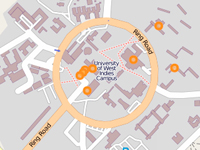muy first blog
Joe Lopez will never forget the day he checked his Bank of America account
online and realized that more than $90,000 had vanished.
Months before, the Miami business owner had stopped making weekly visits to
his local branch, opting instead to conduct his financial transactions entirely
over the Internet.
"I absolutely thought it was safe," Lopez said. "And it was convenient."
What he didn't realize were the risks. A malicious virus had infected his
computer and, in a matter of minutes, captured his user name and password --
allowing a hacker to transfer $90,348 to a rogue overseas account.
Lopez got most of his money back months later, after a federal investigation
and, eventually, a lawsuit. But his experience taught him the hard way, he says,
what many experts have concluded: "Online banking is a danger."
Since its debut just a decade ago, online banking has become one of the
fastest-growing Internet activities. Roughly 43% of people who use the Internet,
or about 63 million Americans, do some banking there, according to a 2006 survey
by the Pew Internet & American Life Project -- even more than make travel
reservations online.
Joe Lopez will never forget the day he checked his Bank of America account
online and realized that more than $90,000 had vanished.
Months before, the Miami business owner had stopped making weekly visits to
his local branch, opting instead to conduct his financial transactions entirely
over the Internet.
"I absolutely thought it was safe," Lopez said. "And it was convenient."
What he didn't realize were the risks. A malicious virus had infected his
computer and, in a matter of minutes, captured his user name and password --
allowing a hacker to transfer $90,348 to a rogue overseas account.
Lopez got most of his money back months later, after a federal investigation
and, eventually, a lawsuit. But his experience taught him the hard way, he says,
what many experts have concluded: "Online banking is a danger."
Since its debut just a decade ago, online banking has become one of the
fastest-growing Internet activities. Roughly 43% of people who use the Internet,
or about 63 million Americans, do some banking there, according to a 2006 survey
by the Pew Internet & American Life Project -- even more than make travel
reservations online.
Joe Lopez will never forget the day he checked his Bank of America account
online and realized that more than $90,000 had vanished.
Months before, the Miami business owner had stopped making weekly visits to
his local branch, opting instead to conduct his financial transactions entirely
over the Internet.
"I absolutely thought it was safe," Lopez said. "And it was convenient."
What he didn't realize were the risks. A malicious virus had infected his
computer and, in a matter of minutes, captured his user name and password --
allowing a hacker to transfer $90,348 to a rogue overseas account.
Lopez got most of his money back months later, after a federal investigation
and, eventually, a lawsuit. But his experience taught him the hard way, he says,
what many experts have concluded: "Online banking is a danger."
Since its debut just a decade ago, online banking has become one of the
fastest-growing Internet activities. Roughly 43% of people who use the Internet,
or about 63 million Americans, do some banking there, according to a 2006 survey
by the Pew Internet & American Life Project -- even more than make travel
reservations online.
- 10019674's blog
- Login to post comments


 Facebook
Facebook YouTube
YouTube Twitter
Twitter WhatsApp +1(876) 499-2291
WhatsApp +1(876) 499-2291